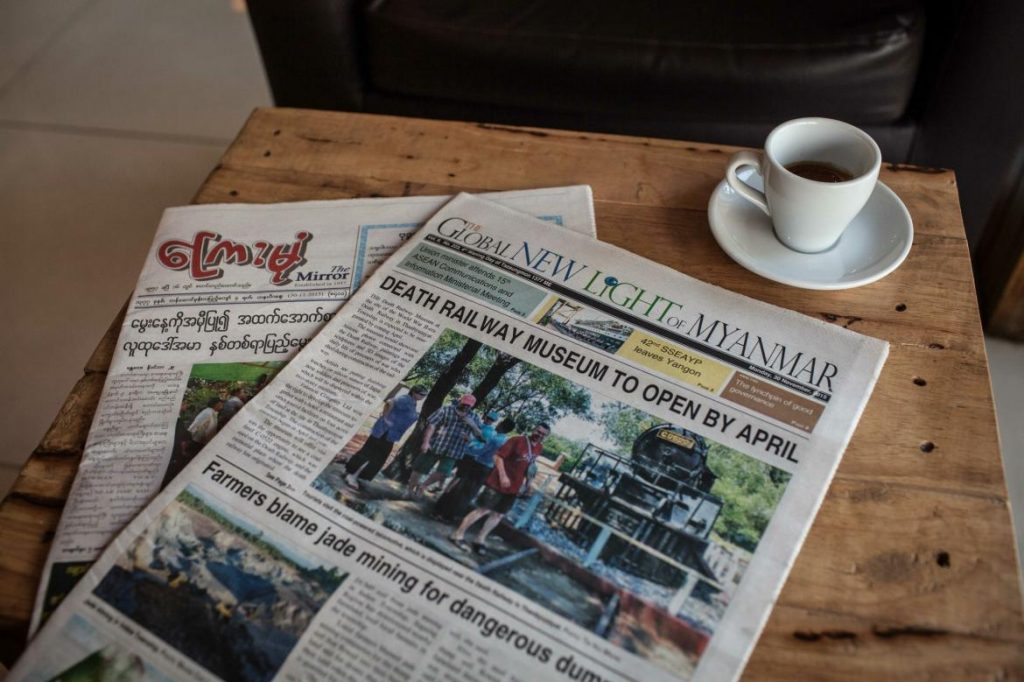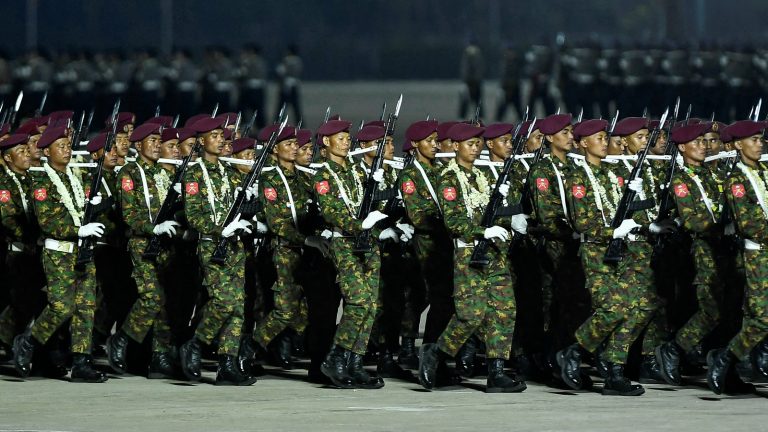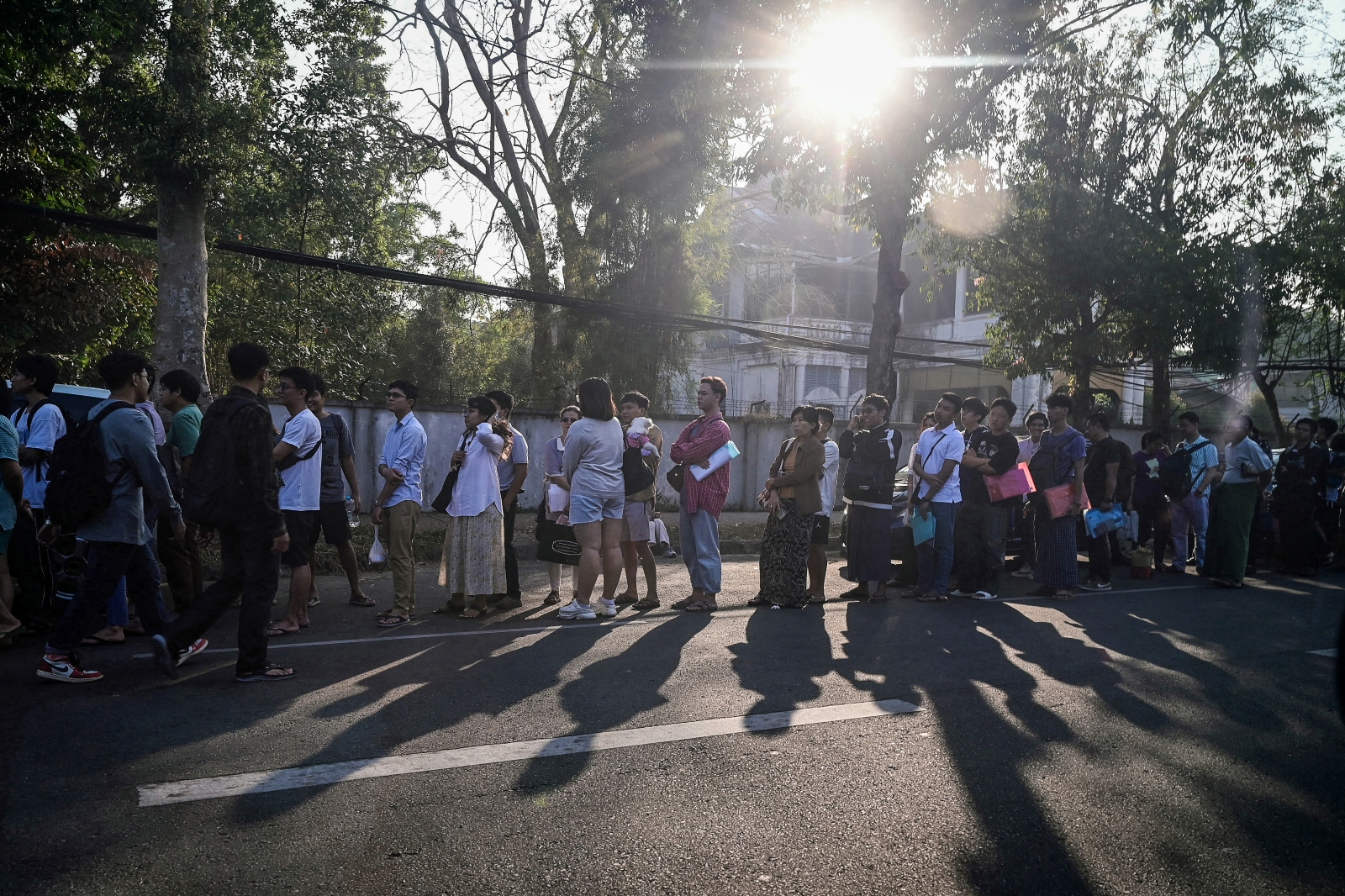The military’s media bans, mass arrests and newsroom raids may have left newsstands barren, but professional and citizen journalists will continue recording the regime’s crimes.
By KHINE
On February 1, when Tatmadaw Commander-in-Chief Senior General Min Aung Hlaing launched a coup d’etat and detained the nation’s civilian leaders, the military also seized state broadcaster MRTV and suspended all five privately-owned, free-to-air TV stations. It was the first in a series of moves targeting the media. More than two months later, media freedom in Myanmar is in a parlous state.
Of the suspended free-to-air stations suspended, the Democratic Voice of Burma and Mizzima TV have since been shut down, while YTV, Channel-K and Fortune are allowed to broadcast entertainment programmes but banned from providing news.
Min Aung Hlaing’s State Administration Council also moved against satellite-based pay TV operator Sky Net, a market leader, and since the coup the navy has occupied its broadcasting studios. Sky Net, which broadcasts scores of channels, was forced to suspend all foreign news channels, including BBC World, CNN, CNA, and NHK World.
The SAC did not stop with television, however. Soon after seizing power, it suspended the licences of all private FM radio stations. Although some, such as Mandalay FM, have been permitted to resume broadcasting, they are restricted to running music programmes only.
Before the coup, Myanmar had five privately-owned daily newspapers; now, all but one have been banned or have otherwise stopped publishing. Daily Eleven, The Voice and the Myanmar Times have all suspended publication voluntarily, while the military council revoked the publishing licence of 7Day News on March 8. All that remains is the Standard Time Daily (San Taw Chein).
On March 8, the SAC also banned all output from online outlets Myanmar Now and Khit Thit Media and multi-media outlets Mizzima and DVB.
These outlets were among the dozens of private daily, weekly or online publications that were licensed after April 1, 2013, under media reforms initiated by the Union Solidarity and Development Party government. The recent banning and voluntary suspensions of so many outlets is a giant leap backward for the Myanmar media, reminding some of the dark days of past military rule, when the public had no right to reliable information or the open exchange of ideas.
But people have already tasted a freer media, and there will be no turning back the clock.
The day the junta announced the licence revocations, police and soldiers also raided Myanmar Now’s office in downtown Yangon, seizing computers, printers and parts of the newsroom’s data server. The outlet has continued to publish online, however, while its reporters live in hiding, regularly moving from house to house and working underground.
The following day, security forces raided Mizzima’s Star City office, in Yangon’s outer southeastern Thanlyin Township.
No journalists were arrested in either raid; staff at both had already begun working remotely to avoid such an outcome. Like Myanmar Now, Mizzima also continues to get out the news.
Similarly, despite the regime revoking Mizzima and DVB’s broadcasting licences, their programmes can still be accessed by two-foot-high satellite dishes – though police are trying to confiscate these. The military has made a Thai satellite company cut both channels from its service, but they appear to still be available for viewers in some parts of the country.
Through the internet, satellite and short-wave radio, the truth is still getting out, and outlets continue to push out news through Facebook and Twitter.
The military council has tried but so far been unable to effectively block these social media platforms. An information-hungry populace has widely been quick to adapt, using virtual private networks to skirt any junta firewall. The SAC responded by restricting internet availability, ordering telcos and internet service providers to shut down access from 1am to 9am each day, and subsequently to suspend all mobile data. Smart phones now only connect in places with fibre internet, except to make calls or send and receive SMS messages.
The military council has also targeted individual journalists, arresting at least 61 – more than half of whom remain in detention as of April 8, according to Detained Journalists Information Myanmar, a Facebook group tracking arrests of journalists. More than a dozen have been charged with incitement under section 505(A) of the Penal Code, which carries a three-year sentence.
The arrests have made some journalists wary of covering protests and other anti-coup activities, and many prominent reporters will not sleep at their own homes for fear that they might be detained in a night-time police raid. Some have even fled Yangon and other major cities to take refuge along the border with Thailand.
But despite the risks, we will continue to file reports and commentary to our newsrooms. Citizen journalists have stepped up to play an invaluable role, too, recording abuses by soldiers and police across the country and publishing these recordings when they have internet access.
Despite the Tatmadaw’s concerted efforts to suppress independent media and impose a news blackout on the country, brave journalists and citizen reporters are ensuring that the military’s crimes are recorded for all the world to see. We will not be cowed.
Khine is the pseudonym of a Myanmar journalist and commentator based within the country.







